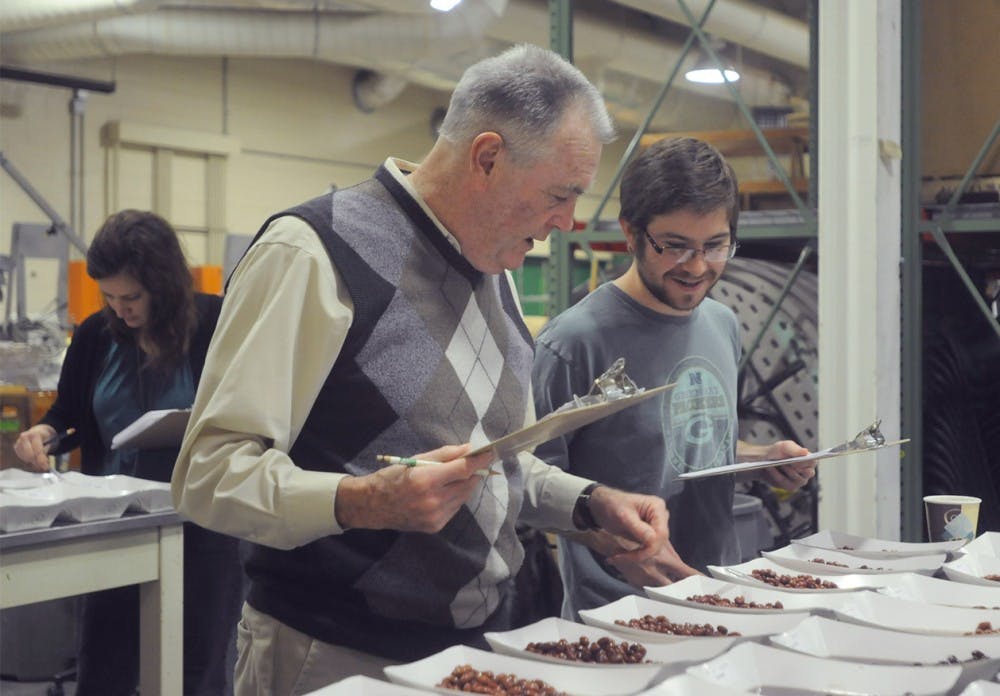In the early morning, in a farm building surrounded by fields full of snow, James Kelly prepares to test the latest research models with his colleagues. Hoping to see improvement over previous attempts, these newest inventions could have both commercial and societal impacts, should they be superior. Old archetypes and new innovations lined side by side, the professionals inspect their harvest, noting which varieties perform best in canning quality.
A typical day for Kelly might vary from season to season. Spring brings planting, summer brings field research, fall work is done in a greenhouse. In the winter, Kelly might make a trip outside of the country for conferences or field research or he might participate in canning evaluations, which was the case on Feb. 4.
“It’s not always the same day to day, that’s one of the fun things,” Kelly said.
Soft-spoken with a reserved Irish accent, Kelly, a university distinguished professor of advanced plant breeding in the Department of Plant, Soil and Microbial Sciences in the College of Agriculture and Natural Resources at MSU, has dedicated nearly 40 years of his life to the breeding and genetics of a crop he considers especially valuable: dry edible beans.
“Beans are such an important food source, they’re a very important food security source in large parts of East Africa,” Kelly said. “Getting some of our ... varieties out there, that can help improve productivity and improve the production on a local level.”
Kelly’s passion for plants began as a child while growing up on a farm in Northern Ireland. He has done his part to push for awareness of the importance of bean research, appearing in a video produced by the Big Ten Network in which he spoke about MSU’s ranking of number university in the country for bean breeding and genetics.
Kelly first found his calling as an undergraduate student. In his studies during time of the Green Revolution, Kelly said he was fascinated by the sheer number of lives the work of those that came before him saved and how much plant breeding could do to help people.
During his doctoral studies at University of Wisconsin, Kelly worked on project with a professor who was involved with beans, and he’s been in the field ever since.
“When I first came (to MSU), Michigan was the leading producer of dry beans in the country, so we’ve had a breeding improvement program here for over 100 years,” Kelly said. “I had the opportunity to join that program in 1980.”
Kelly’s work has taken him across continents, having visited Mexico, Guatemala, Ecuador, Rwanda, Uganda and Zambia as locations for his research and fieldwork.
“It’s very gratifying to see some of that science get implemented in these countries and have an impact,” Kelly said. “When you go to small countries and see that they’re actually food sufficient in beans, that’s very gratifying.”
In addition to his work on developing new varieties, Kelly also trains graduate students in plant breeding, many of whom come from overseas with hopes of making an impact on their home countries. Isaac Dramadri, a native of Uganda, is one such individual.
“This bean is one of the main crops in Uganda, being here is very good for me because it gives me skills to translate whatever I learn here ... and improve life over there,” Dramadri said.
Dramadri said Kelly is the best role model to help him improve life in Uganda.
“He’s like a parent to me right now,” Dramadri said.
Among the seeds Kelly has sown are alumni the likes of Gerardine Mukeshimana, the now minister of agriculture and animal resources in Rwanda. Immensely proud of his students, Kelly said the opportunity to train others in his field is his proudest accomplishment.
“Having trained a large number of students and seeing them out making an impact in their own respective areas is very satisfying,” Kelly said. “Internationally, we have a reputation that we’re at the edge of scientific development of new genetics in beans, and therefore then we’re able to bring in and train young scientists from overseas, in international programs, for them to have an education.”
James Kells, the chair of the Department of Plant, Soil and Microbial Sciences, has more than a similar name in common with Kelly. He has worked with Kelly for approximately 30 years, so long he can’t remember which of them was there first. Kells speaks very highly of Kelly and his work, constantly falling back to the words “impact,” “contribution” and “important.”
“He has made major contributions in the genetic research he has conducted, in the varieties he has released, and the graduate students he has educated,” Kells said
Kelly said he plans to retire “fairly soon,” but his goals for the future have rarely changed.
Support student media!
Please consider donating to The State News and help fund the future of journalism.
“In plant breeding it’s one of those efforts where once you achieve a new variety, it sets a standard and you want to improve on that,” Kelly said. “That process is ongoing, all the time.”
Discussion
Share and discuss “MSU professor's bean research has impact across world” on social media.







